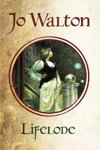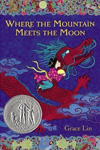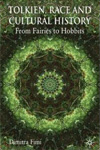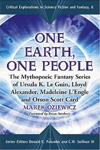Mythopoeic Awards
Acceptance Remarks — 2010
2010 Mythopoeic Fantasy Award for Adult Literature
Jo Walton, Lifelode
This was my ugly stepchild book
It never seemed to work at all
Just lurched along from flight to fall
And seemed to crumple at a look.
Domestic fantasy is tough
The form seems to require a quest
Not complex families at rest,
Quiet magic never seems enough.
The Inklings mean a lot to me
I am delighted and surprised
You like my quirky fantasy,
Sans king, sans dragon, dwarf, or elf
but Mythopoeically prized!
Thanks for the lion for my shelf.
2010 Mythopoeic Fantasy Award for Children’s Literature
Grace Lin, Where the Mountain Meets the Moon
Dear Mythopoeic Society,
Thank you so much for this amazing honor! I was so surprised when I received the news, I think one of the reasons why I didn’t attend the conference was because I felt sure of an embarrassing academy-award losing moment when the winner was to be announced (also, I have a horrible deadline that I’m already late for). Considering your list of past and present honorees, as well as your extremely neat Aslan statue, this was a glorious surprise.
As a child, I loved the Narnia series, as a teenager I loved The Lord of the Rings and as an adult I loved both. Strangely, I remember reading those books during the brightest times of my life, but also at the darkest. What I read in those books was thrill of adventure that filled me excitement, but also the determination against despair that gave me courage.
And those books were amongst the many inspirations that convinced me to attempt to write Where the Mountain Meets the Moon. Writing the book was not an easy journey, but Frodo and Reepicheep helped keep me on the path.
Which is why receiving this award from Mythopoeic Society is especially touching. It is a true honor that you think that my work carries on the traditions of those very books I so admire. Thank you very much!

Thank you very much.
2010 Mythopoeic Scholarship Award for Inklings Studies
Dimitra Fimi, Tolkien, Race, and Cultural History: From Fairies to Hobbits
I am absolutely delighted and very honoured to accept this award.
My book started its life as a Ph.D. thesis, comprising three years of frantic reading and annotating Tolkien’s extended legendarium. I was lucky to study Tolkien’s manuscripts at Marquette University and in the magnificent Bodleian Library in Oxford. I also spent a long time researching the intellectual and cultural context of Tolkien’s work. To all the people who helped me along the way, a very big thank you.
In the midst of all of this, I was also trying to catch up with the ever-augmenting corpus of Tolkien scholarship! The books honoured by this very award during the last few years opened the way for further insights into Tolkien’s mythopoeia — my book wouldn’t have been possible without them!
What I hope my book will do is encourage new scholars to look at Tolkien’s legendarium (not just The Hobbit and The Lord of the Rings) in a serious way. Reading The History of Middle-earth series is a daunting venture, but ultimately so rewarding in terms of insights, and the brilliant moments of inspiration and creativity expressed. There is still so much to be said about Tolkien’s grand mythological project, especially so in light of the on-going publication of yet more of his scholarly and linguistic manuscripts.
Being Greek, I cannot help but be moved by Tolkien’s use of my language: "eucatastrophe", the term "angelos" for the Istari, "ecumene" for Middle-earth. But my favourite word is "mythopoeia", a word that has become part of many scholars’ standard vocabulary when studying fantasy and the fantastic in literature, from William Blake to Harry Potter. I am sure that the Mythopoeic Society will continue to promote the study of this ever-evolving genre, and encourage younger scholars such as myself to join a long-established community of students of the works of J.R.R. Tolkien, C.S. Lewis, and Charles Williams, and many other writers.
I wish I was among you tonight, to accept this award in person! I hope to be able to attend Mythcon at some point in the future! Thank you very much once more!

2010 Mythopoeic Award for Myth and Fantasy Studies
Marek Oziewicz, One Earth, One People: The Mythopoeic Fantasy Series of Ursula K. Le Guin, Lloyd Alexander, Madeleine L’Engle and Orson Scott Card
Dear Council of Stewards, Dear Members of the Mythopoeic Society,
I’m deeply honored to accept the 2010 Mythopoeic Award in Myth and Fantasy Studies. Mythopoeic fantasy has always been close to my heart and I’m grateful to the Society for recognizing One Earth, One People as a worthy contribution in the field of research on myth and fantasy.
I accept this award tonight also on behalf of those friends, advisors and well-wishers without whose help One Earth, One People might not have been written. They are too many to name, but to my friend Devin Brown, a contagiously inspiring Lewis scholar, and to the Fulbright Foundation I owe my special gratitude.
As a teenager growing up in Communist Poland I had known the liberating and transformative potential of mythopoeia long before I chose the study of literature as my career. To my generation, living on the cusp of liberty yet still in the shadow of soon-to-collapse Communism, The Chronicles of Narnia and The Lord of the Rings offered an amazing reading experience. Narnia came first. Even though I was only eleven I emotionally linked the White Witch’s attempt to freeze Narnia in eternal winter with the introduction of the martial law in Poland in December 1981 — a winter that lasted almost two years. My father, an active member of Solidarity, like the political opponents of the Witch, was ‘turned into stone’ by being arrested for months at a time between 1982 and 1985. When I was 14, during one of the police searches of our apartment, an officer who was looking through my room picked up a copy of The Lion, the Witch and the Wardrobe. “You read this?” he asked with a sneer. As he condescendingly tossed the book on my bed, he added “fairy tales, as if implying that these are foolish books for foolish people. But I knew freedom was not a foolish dream. I sensed that he was afraid of it — of imagination and change — and that his disdain was an attempt to mask that fear. I knew that Aslan was on the way.
My experience with The Lord of the Rings was different, but also life-altering. I first read it when I was 16 and it helped me understand how even small choices can lead to great changes. From The Lord of the Rings I learned the courage not to comply, to stick to what I know is right despite external pressure to do otherwise. I learned that even the smallest person matters for we can never know what will tip the balance of affairs larger than ourselves. This, I later learned from reading Madeleine L’Engle, is called “the butterfly effect” and I feel I am part of it now.
Today, over twenty years later, I realize that I would never have done what I was able to do was it not for a deeply transformative experience of reading The Chronicles of Narnia and then The Lord of the Rings. Back in 1980s I would not have believed that the fascination with Lewis and Tolkien would take me where I am now. It did, and it enriched my life in more ways I can tell.
What I aimed to achieve in One Earth, One People was to describe mythopoeic fantasy and suggest its transformative potential for the contemporary world. I believe our 21st century globalized planet needs mythopoeic literature more than ever; we need such literature to help us dream ahead, with courage and responsibility, about what makes human life worthwhile and about how best to meet challenges facing us today as One People on One Earth. Mythopoeic literature is not about the past but about now. It does not preach about brotherhood of man — it lives and describes it, on every page.
There is no other professional organization like the Mythopoeic Society: a voluntary organization of people who help promote and study mythopoeic literature; literature which transforms people’s lives by helping them find spiritual and moral bearings. And there is no other award like the Mythopoeic Award: the most important award for the study of mythopoeic fantasy. It is thus both humbling and exciting to know that One Earth, One People may become a useful resource for other scholars in the field.
I regret that I am unable to join you tonight, but I cherish the award and I thank you all for this most meaningful honor.
